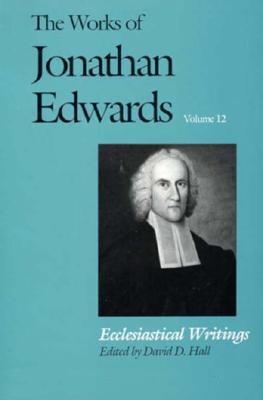- Bible
- Read the Bible
- Bible Versions
- Verse of the Day
- Reading Plans
- Verses by Topic
- Books of the Bible
- Bible Images
- Study
- Commentaries
- Concordances
- Dictionaries
- Encyclopedias
- Sermons
- Bible Atlas & Maps
- BP Wiki
- Devotionals
- Today's Devotionals
- Light of the World
- All Devotionals
- Inspirational Quotes
- More
- Picture Quotes
- Videos
- Inspirational
- Bible Study
- What The Bible Says
- Bible Q&As
- Daily Bread
- Bible by Genre
- Bible Stories
- Random Bible Verse
- Community
- Store
The Works of Jonathan Edwards, Vol. 12: Ecclesiastical Writings
by Jonathan Edwards
This volume includes four documents by Jonathan Edwards on the nature of the church, documents that reveal his views on ecclesiology, congregational autonomy, ordination, and admission to church membership and to the sacraments. The first document, reprinted here for the first time since the eighteenth century, is Edwards' defense of his fellow Hampshire County ministers in the Robert Breck controversy of 1735-36. The other three documents relate to Edwards' efforts to restrict admission to the sacraments at Northampton in 1749-50, actions that ultimately led to his dismissal as pastor: An Humble Inquiry explicates his reasons for refuting his grandfather and predecessor Solomon Stoddard's open admission policy; Misrepresentations Corrected is Edwards' response to his cousin Solomon Williams' criticisms of the Humble Inquiry; and Edwards' untitled narrative, available before only in Sereno Dwight's 1829 edition and here newly re-edited, gives details his final conflict with his Northampton congregation. The general introduction by David D. Hall places these writings in their contemporary polemical contexts and locates Edwards in a historical framework that highlights his Puritan, Congregational heritage and the tensions between lay and clerical piety. It also provides an important reassessment of Edwards' relationship to Stoddard in the light of Edwards' experience during and after the Great Awakening.
BUY NOW
Hardcover, 674 pages
Published June 22nd 1994 by Yale University Press
© 2025 Bibleportal.com All rights reserved.

Jonathan Edwards (1703 - 1758)
was a Christian preacher and theologian. Edwards "is widely acknowledged to be America's most important and original philosophical theologian," and one of America's greatest intellectuals. Edwards's theological work is broad in scope, but he was rooted in Reformed theology, the metaphysics of theological determinism, and the Puritan heritage. Recent studies have emphasized how thoroughly Edwards grounded his life's work on conceptions of beauty, harmony, and ethical fittingness, and how central The Enlightenment was to his mindset. Edwards played a critical role in shaping the First Great Awakening, and oversaw some of the first revivals in 1733–35 at his church in Northampton, Massachusetts.Edwards delivered the sermon "Sinners in the Hands of an Angry God", a classic of early American literature, during another revival in 1741, following George Whitefield's tour of the Thirteen Colonies. Edwards is well known for his many books, The End For Which God Created the World, The Life of David Brainerd, which served to inspire thousands of missionaries throughout the 19th century, and Religious Affections, which many Reformed Evangelicals still read today.
Jonathan Edwards was a colonial American Congregational preacher, theologian, and missionary to Native Americans. Edwards "is widely acknowledged to be America's most important and original philosophical theologian."
His work is very broad in scope, but he is often associated with his defense of Reformed theology, the metaphysics of theological determinism, and the Puritan heritage. His famous sermon "Sinners in the Hands of an Angry God," is credited for starting the First Great Awakening. Edwards is widely known for his books Religious Affections and The Freedom of the Will. He died from a smallpox inoculation shortly after beginning the presidency at the College of New Jersey (later to be named Princeton University). Edwards is widely regarded as America's greatest theologian.
Jonathan Edwards was the only boy among eleven children. In 1720 he graduated from Yale as the valedictorian of his class. He continued at Yale working on a graduate degree in theology and was saved at the age of seventeen. Edwards was ordained in 1727 and joined his grandfather as an assistant pastor. In 1729 he became pastor of the church in Northampton, Massachusetts, which had some six hundred members. In 1735 God's blessing on his preaching resulted in a great revival with more than three hundred people saved and added to the church. Edwards is considered to be one of the men most responsible for the Great Awakening. His famous sermon, "Sinners in the Hands of an Angry God," was first preached in 1741 at Enfield, Massachusetts. In 1750 Edwards was voted out by his church after his attempt to limit church membership to those who made a profession of faith in Christ.
He spent the next seven years as a missionary to the Indians at Stockbridge, Massachusetts. In 1758 he accepted the presidency of the College of New Jersey (now called Princeton). After just weeks on the job, he died from smallpox brought on by an inoculation to protect him from the disease. Jonathan Edwards and his wife had eleven children. He spent one hour each night in conversation and instruction with his family. His daughter Jerusha was engaged to David Brainerd when he died of tuberculosis. Edwards' two most famous literary works are The Life and Diary of David Brainerd (1749) and Freedom of the Will (1754). Edwards is buried in Princeton, New Jersey.
... Show more